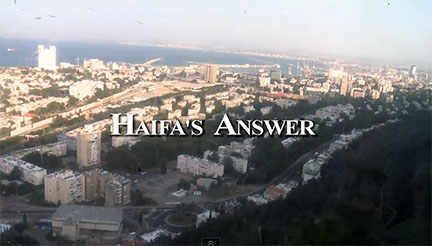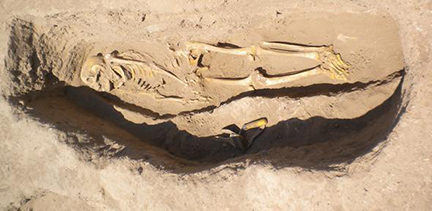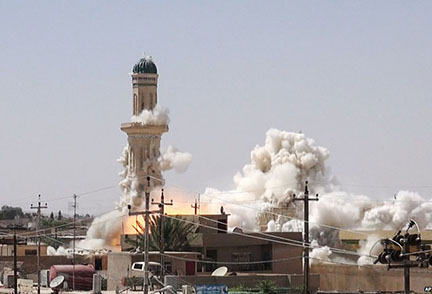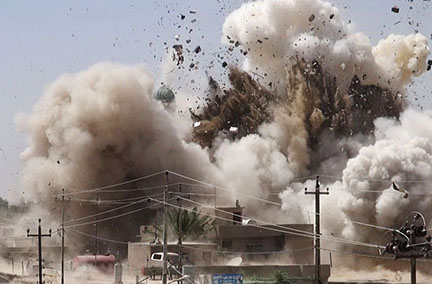
On Youtube there is a fascinating film on co-existence in Haifa. It is well worth watching at this time of intense violence in Gaza.

On Youtube there is a fascinating film on co-existence in Haifa. It is well worth watching at this time of intense violence in Gaza.

[Sinan Antoon channeling Jonathan Swift…]
by Sinan Antoon, al-Jadaliyya, July 15, 2014
The rise of ISIS and the declaration of a Caliphate that controls large swaths of Iraq and Syria signals a moment of exceptional danger not only for Iraq and its future existence as a state, but for US national interests.
The United States has sacrificed life and limb and invested billions of dollars to save Iraq from dictatorship and help its people build a thriving democracy. Mistakes were made for sure, but our intentions and objectives were always clear: to stabilize and democratize the region. President Obama’s craven policies and his withdrawal from Iraq have squandered the credit and political capital the US held in Iraq and the region. Sending advisors and providing logistical support to Baghdad is insufficient and will not weaken or defeat ISIS. President Obama has allowed Iran to step in and further strengthen its grip on Iraq.
As we write this, Iraqi parliamentarians are voting to choose new leaders. While ditching Maliki is a necessary step for moving forward, we believe that the gravity of the situation calls for a radically different approach. The Caliphate has its eyes on Baghdad and other capitals in the region. Its Jihadist ideology has already attracted hundreds of young Muslims from Europe and elsewhere who have joined its ranks. The violence will be exported to the free and civilized world and this threatens to squander all the hard-fought gains of the war on terror. Continue reading A Practical Solution for Iraq

by MURAT HAZINE, Turkey Agenda, July 9, 2014
The Islamic State in Iraq and al-Sham (ISIS) is a new shadow that appeared while we were trying to differentiate between the “New Middle East†and the “Great Middle East†which is a result of the Republican tendencies of the US. Nobody has any information regarding which country the ISIS is shadow of. Also, it is unknown that ISIS which acts as an ideal troublemaker in Iraq and Syria today would be carrying out the same duties in any country it has potential members in. Nevertheless, it is necessary to make an evaluation over the structure, methods and the possible actions of this shadow. In that case, we need to initiate our efforts to understand from here: Which ISIS? What influenced trigger the changes experienced by this group that came to prominence with its different sides throughout the time? After the death of Abu Mus’ab al-Zarqawi, his followers had formed an alliance named the Islamic State of Iraq. This alliance was a union of Sunni groups such as Mujahideen Shura Council, Jaysh al-Fatiheen, Jund al-Sahaba and Jaish al-Taiifa al-Mansoura that all served a common purpose. And, the reason behind the break of relations between the Islamic State of Iraq and Sunni tribes was the formation of this alliance. This alliance first called on Sunni tribes to be committed to them and then, targeted the leaders and the important figures of the tribes that did not accept the invitation. Continue reading On the trail of a shadow: Which ISIS?

by Hasan Azad, al-Jazeera, July 11, 2014
What do the Islamic State, Boko Haram and the Taliban all have in common? Extremism? Caliphatism? Violence? All these things are merely incidental to these groups. What is essential to them is that they are all thoroughly modern formations. So what do I mean by this, given that they tend to strike us as the very antithesis of modernity?
First of all, it is crucial to ask ourselves what it is that we understand by modernity. We assume that modernity means reason, science, freedom, justice, racial, gender, and sexual equality. These are the assumptions. They are the ideals that are projected by a strident western discourse, where the West is seen as their progenitor and purveyor.
Perhaps it will strike the reader as a little odd if I say that these ideals are far from being realised within the West. That there are massive inequalities of sexualities, of genders and of races in the West. That western freedom, whether political, economic or consumerist, comes at the expense of the freedom of people living in non-western countries.
And this lack of freedom runs far and deep, reaching into the history of how non-European people were made to think during colonial times. For example, any serious study of the history of colonialism and its educational projects in its colonies reveals the extent to which Europe reconfigured indigenous modes of knowing with its own mode of thinking – a manner of thinking which has its roots in the Enlightenment, with its own idiosyncratic means of reasoning. Continue reading Modernity according to the Islamic State, Boko Haram, the Taliban et al

Chalcolithic burial at Zeidan; Credit: Gil Stein, Oriental Institute, University of Chicago
6200-year-old parasite egg may be first proof of early human technology spreading disease
Latest research shows that schistosomiasis, a disease caused by flatworm parasites, may have been spread by earliest crop irrigation in ancient Mesopotamia, suggesting early technology exacerbated disease burden.
The discovery of a schistosomiasis parasite egg in a 6200-year-old grave at a prehistoric town by the Euphrates river in Syria may be the first evidence that agricultural irrigation systems in the Middle East contributed to disease burden, according to new research published in Lancet Infectious Diseases.
Schistosomiasis is a disease caused by several species of flatworm parasites that live in the blood vessels of the bladder and intestines.
Infection can result in anaemia, kidney failure, and bladder cancer. This research shows it may have been spread by the introduction of crop irrigation in ancient Mesopotamia, the region along the Tigris-Euphrates river system that covers parts of modern-day Iraq, Iran, Kuwait, Syria, and Turkey. Continue reading Schisto in Mesopotamia


al-Qubba Husseiniya, a Shia shrine, being blown up in the city of Mosul.
Hollywood is known for creating absurd scenarios, especially with special effects of explosions and cars flying through the air. The real damage is done in war with bombs ripping apart buildings and bodies. And then there is the wanton destruction of buildings out of sheer hatred. The would-be caliphate that has taken nominal control of a large swathe of Syria and Iraq is an affront to everyone, including fellow Muslims in Syria and Iraq. There will be no new caliphate created out of such callous regard for human life and eventually the rebel leader Abu Bakr al-Baghdadi will follow Saddam Hussein to the netherworld. But the destruction in the meantime is mean indeed. In addition to the men gunned down in Mosul and elsewhere, bulldozers and bombs are destroying some of the splendid Iraqi shrines from the real caliphates. It is a sad day (far too many sad days, weeks, months and years) for Syria, Iraq, Muslims worldwide and the entire world. But the leader of ISIS cannot erase history, no matter how many shrines and mosques he blows up.

By Sheila Carapico, Middle East Research and Information Project, July 14
* This memo was prepared as part of the “Ethics and Research in the Middle East†symposium
American political scientists studying the Middle East face ethical dilemmas not shared by most of our disciplinary colleagues. Sometimes – perhaps unexpectedly – our presence in countries or communities experiencing repression and/or political violence puts our local colleagues, hosts, or contacts at risk by association. The massive U.S. military footprint and widespread mistrust of U.S. policies and motives multiplies the risks to our interlocutors.
The trademark methodology of American Arabists is fieldwork, meaning, in political science, in-depth interviews, participant observation, data collection, document-gathering, opinion polling, political mapping, and recording events. As sojourners but not permanent residents, we rely heavily on the wisdom, networks, and goodwill of counterparts “on the ground,†particularly other intellectuals.
In any environment where agencies of national, neighboring, and U.S. governments are all known to be gathering intelligence, our research projects may look and sound like old-fashioned espionage. Even under the very best of circumstances (which are rather scarce) a lot of people are wary or suspicious of all Americans, including or sometimes especially Arabic speakers who ask a lot of questions and take notes. Immediate acquaintances probably grasp and trust our inquiries. Their neighbors or nearby security personnel may not. It is common knowledge that at least some spies and spooks come in academic disguise and that some U.S.-based scholars sell their expertise to the CIA or the Pentagon. Instead of treating whispered gossip as the product of mere paranoia or conspiracy theories, we need to recognize its objective and sociological underpinnings. Continue reading On The Moral Hazards of Field Research in Middle East Politics

Misapprehending Muslims and the Media’s Misinformation
by Hasan Azad, Huffington Post. November 17, 2012
My friend Sim is a strapping young man in his 20s. He is fitter than I could ever dream of becoming. Sim has run in the New York marathon for two years in a row, and hopes to run in many more to come. When you meet Sim you’re immediately struck by the warmth of his smile. Opinions are unanimous, Sim has a heart of gold — and the good looks to go with it!
Sim was recently flying back to New York from visiting with his parents in Texas, when the chipper middle-aged Texan lady sitting next to him asked in the most disarmingly matter-of-fact manner that only Texans are capable of, “You’re not a Muslim are you?” A question possibly prompted by Sim’s full-length beard and turban. When he responded, “No, I’m Sikh,” the woman was visibly relieved, so much so she hugged Sim (short for Simran, in case you’re wondering), adding “I’m so glad you’re not a Muslim. They want to take over America with ‘Siran’!” Simran, being the gentleman that he is, smiled politely, but later revealed to me that he had no idea how to respond to the exchange. And it’s true, it wasn’t a “simple” exchange that had occurred, which could or should be explained away as another example (and aren’t there so many?) of unwitting Texan folk who can’t tell the difference between a Sikh and a Muslim. Continue reading Sikh and ye shall find “Siran”